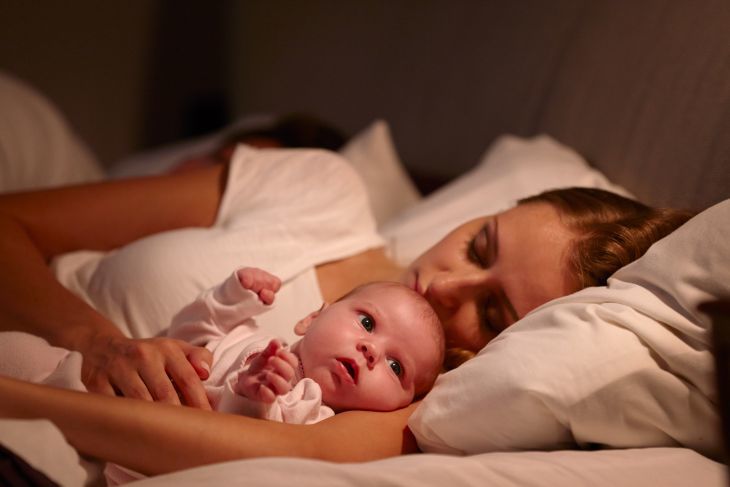Bed Sharing vs Co Sleeping With Infants
Bed sharing, also known as co-sleeping, is when two or more people share the same bed. It can be done with infants and children of any age. Co-sleeping offers a number of benefits to both parents and babies; it helps promote bonding between parent and child, provides comfort for both parties involved, encourages breastfeeding on demand, reduces stress levels in parents by allowing quicker response times to nighttime needs such as feeding or soothing, and can help regulate baby’s sleep patterns.
However there are risks associated with bed sharing including increased risk of SIDS (Sudden Infant Death Syndrome), suffocation from pillows/blankets/bedding materials being too close to an infant’s face or head area; overheating due to excessive covers; entrapment in between mattress gaps; falling out of the bed if not secured properly etc., which makes co sleeping safer than bed sharing especially when done safely following safety guidelines set forth by healthcare professionals.
Bed sharing and co-sleeping with infants are both popular choices for parents. Bed sharing involves sharing a bed with your baby, while co-sleeping means having your infant sleep in the same room but in their own separate sleeping space. Both methods can help to create an intimate bonding experience between parent and child as well as provide ease of nighttime feedings.
However, it is important to follow guidelines from experts when deciding which option is best for you and your family. Make sure you research safe practices such as using a firm mattress without pillows or blankets, ensuring there is no gap between the mattress and wall, not allowing anyone else in the bed who has been drinking alcohol or smoking cigarettes, etc., before making any decisions about where your baby will sleep at night.
Co Sleeping Killed My Baby
Co-sleeping, which is when an infant sleeps in the same bed as their parents or caregivers, can be a dangerous practice that has resulted in tragic deaths. One such case was reported by the media in 2019 where a baby died from suffocation after becoming trapped between his mother and mattress while co-sleeping. It is important to note that this was not due to any negligence on the part of his parents; rather, it was an unfortunate accident caused by engaging in a risky sleeping arrangement.
As heartbreaking as these cases may be, they are important reminders of why proper safety precautions should always be taken when co-sleeping with infants.
Bed-Sharing With Newborn
Bed-sharing with a newborn can be an incredibly beneficial experience for both the baby and parents, as it helps foster attachments between them and improve sleep quality. It also allows the child to spend more time in close contact with their parent, promoting bonding and allowing them to respond quickly when they sense something is wrong. However, it is important that bed-sharing be done safely; infants should always sleep on their back on a firm surface without any soft objects or loose blankets nearby.
Additionally, adults who choose to co-sleep should never do so while under the influence of alcohol or drugs.
Psychological Effects of Co Sleeping
Co-sleeping is a practice that many parents opt for in order to keep their little ones close and safe. While co-sleeping can have its benefits, such as providing comfort and convenience, there are some psychological implications associated with this type of sleeping arrangement. Studies show that children who sleep in the same bed as their parents may experience feelings of insecurity, clinginess, anxiety or fear due to lack of independence.
Additionally, these children may also develop attachment issues and difficulty forming healthy relationships outside of the family unit. Therefore, it’s important for parents to be mindful when considering whether or not to co-sleep with their child.
Is It Safe to Co Sleep With a 1 Year Old
Co-sleeping with a 1 year old is generally considered safe, as long as your bed and bedding are free from any potential hazards. It’s important to ensure the mattress is firm and that there are no pillows, blankets or loose items in the bed with your baby. Additionally, it’s best to make sure both parents are not impaired by alcohol or drugs while co-sleeping since this can increase the risk of suffocation.
Ultimately, how you choose to sleep with your baby depends on what works for you and your family.
Bed-Sharing Death Statistics
According to the Centers for Disease Control and Prevention (CDC), 3,500 infants in the United States die each year due to sleep-related deaths, including those that occur while bed-sharing. The American Academy of Pediatrics recommends against bed-sharing as it increases a baby’s risk of sudden infant death syndrome (SIDS) or other sleep-related causes of infant death.
Why is Bed-Sharing Dangerous
Bed-sharing, or co-sleeping, can be a dangerous practice for infants. Bed-sharing increases the risk of sudden infant death syndrome (SIDS), suffocation, entrapment and strangulation. Additionally, babies may become overheated if exposed to too many blankets or adult body heat while sleeping in an adult bed.
The American Academy of Pediatrics recommends that all infants sleep in their own cribs or bassinets to reduce the risk of SIDS and other sleep related deaths.
What Age is Bed-Sharing Safe
Bed-sharing, also known as co-sleeping, is a common practice among newborn and infant families. While it can provide emotional comfort for both parent and child, there are important safety considerations to keep in mind. The American Academy of Pediatrics (AAP) suggests that bed-sharing may be safe for babies over the age of 4 months if certain precautions are taken, such as having baby sleep on their back on a firm mattress free from soft objects like pillows or blankets and away from any kind of adult bedding or other potentially hazardous items.
Additionally, parents should never smoke, drink alcohol, or use drugs while sharing the same sleeping space with their baby.
Bed-Sharing Baby Death
Bed-sharing baby death is an unfortunate tragedy that can occur when a parent or caregiver shares their bed with an infant. The American Academy of Pediatrics recommends against bed-sharing because it increases the risk of sudden infant death syndrome (SIDS) and accidental suffocation, as well as other health risks to both the parents and baby. If you do choose to bedshare, be sure to follow safe sleep guidelines such as using a firm mattress, keeping blankets away from your baby’s face, and never sleeping on the same surface with them.
:max_bytes(150000):strip_icc()/GettyImages-1022137204-bfa02646bdf846dbb6d0d01a41545ef8.jpg)
Credit: www.verywellfamily.com
Can Parents Bed Be Shared With Infant Sleeping?
Sharing a bed with an infant can be a great way to bond and create a sense of security for both parent and baby. It is important, however, that the parents take certain safety precautions when sharing their bed with an infant. Make sure that you have a flat mattress without pillows or blankets in the area where your baby will sleep; this helps to ensure that there are no suffocation hazards present.
Be aware of any gaps between the headboard and mattress which could pose as strangulation risks if your baby gets wedged inside them. Place the baby on its back while sleeping, as this is one of the safest positions for infants during sleep time. Also make sure to keep all other items away from your babies’ sleeping area such as toys, electronics and cords- these can also increase risk of injury or death due to choking or entanglement hazards.
Finally, always use common sense when deciding whether or not it’s safe for you to share a bed with your infant- if either parent smokes cigarettes, has consumed alcohol prior to laying down with their child or is overly tired then this increases risk of SIDS (sudden infant death syndrome) so it’s best practice not do so under those circumstances.
What Age is It Safe to Bed Share With Baby?
Bed sharing is an age-old practice that has been used for centuries to help parents bond with their babies and keep them safe. However, it’s important to understand what age is safe for bed sharing so you can ensure your baby’s safety and well-being. Generally speaking, experts recommend against bed sharing until a baby is at least four months old.
This gives the baby time to develop stronger neck muscles which helps prevent suffocation while sleeping in an adult bed. Additionally, infants should never sleep in a bed with adults who are overly tired or under the influence of alcohol or drugs as these conditions increase the risk of Sudden Infant Death Syndrome (SIDS). Furthermore, there should be no extra blankets or pillows on the adult mattress when co-sleeping as these could lead to accidental strangulation if they were pulled over the infant’s face during sleep.
Ultimately, understanding when it’s safe to start bedsharing will help you establish a healthy sleeping pattern for both you and your baby without putting either one at risk of harm.
Is It Safe for Both Parents to Sleep at the Same Time With a Newborn?
Having a newborn in the house can be incredibly exhausting, especially for new parents! It is common to wonder if it is safe for both parents to sleep at the same time with their baby. The answer is yes – with some important caveats.
First, never put your baby on an elevated surface when you are sleeping, such as a couch or armchair; always use a flat and firm mattress on the floor. Additionally, make sure that there are no extra pillows or blankets near your baby’s face that could impede breathing. Lastly, ensure that any wires or cords from lamps or other electronics do not reach near the area where your baby will be sleeping.
With these precautions taken into account, there is no reason why both parents cannot sleep at once with their infant provided they have made necessary preparations to create a safe space and environment for them all to rest together peacefully.
Why Do Babies Sleep Better Bed-Sharing?
Babies naturally seek comfort and closeness with their parents, especially at night. Bed-sharing is a practice that has been used by many cultures around the world for centuries as a way to promote bonding and help babies get better sleep. When bed-sharing, babies are able to more easily recognize familiar smells from their parent which can put them at ease and encourage deeper sleeping patterns throughout the night.
Additionally, when bed-sharing it’s easier for moms or dads to detect small changes in breathing or body temperature in order to be alerted if something may not be right with their baby’s health. This can provide an extra layer of safety for babies who are too young to communicate any issues they may have during the night hours. Lastly, because it is such a comforting activity for both parents and babies alike, bed-sharing often leads to improved mental wellbeing due its ability to make everyone feel closer together while getting much needed restful sleep!
7 Essential Tips to Make Co-Sleeping Safer
Conclusion
In conclusion, both bed-sharing and co-sleeping can have their benefits and drawbacks. Ultimately, it is up to the parents to decide what works best for them and their baby. The most important thing is that all safety measures are taken into account when making any decision about sleeping arrangements for your infant.
It is also important to be aware of cultural or religious beliefs that may influence the parent’s decisions regarding bed sharing or co-sleeping with infants.

